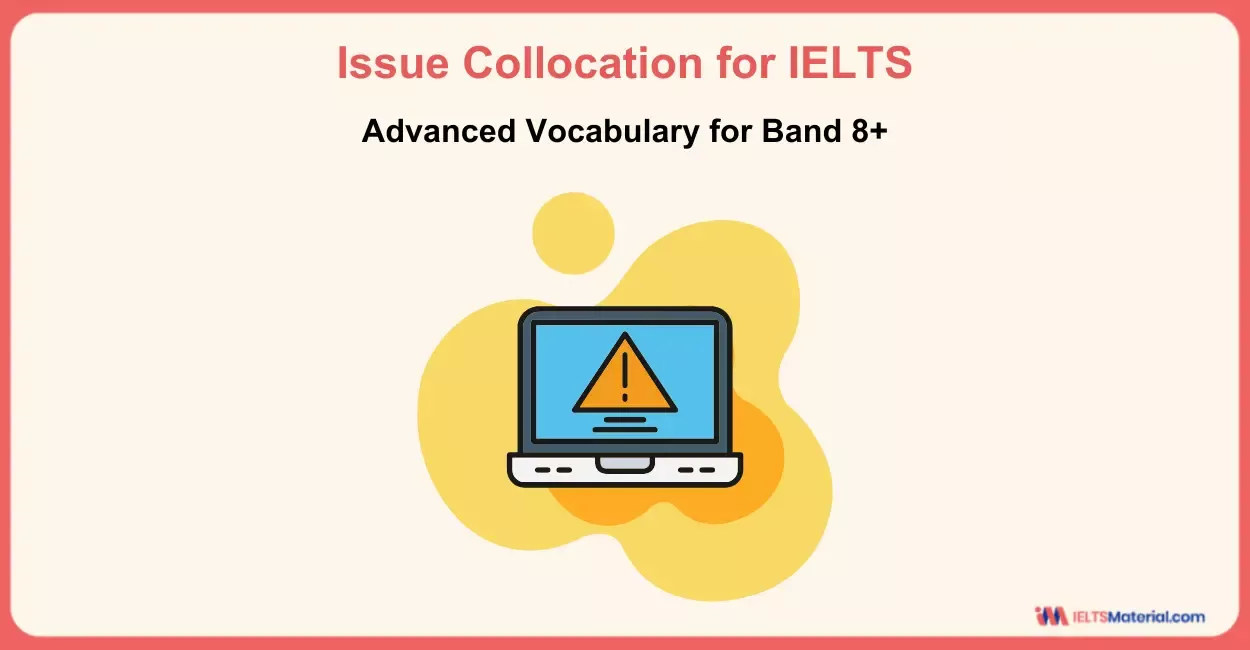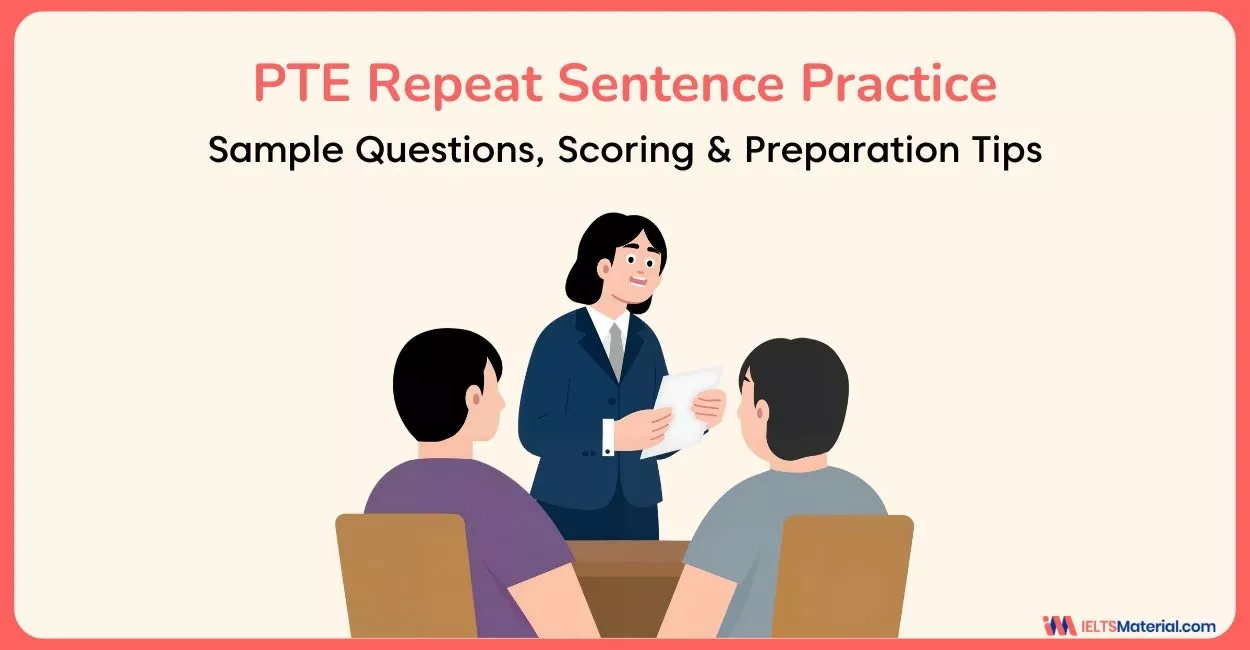Issue Collocation for IELTS - Advanced Vocabulary for Band 8+
6 min read
Updated On
-
Copy link
Explain problems, causes, and solutions clearly and fluently with advanced vocabulary in Issue Collocation for IELTS and its different types. Dive into the band 8+ tips, examples, exercises, and more.
Table of Contents

Limited-Time Offer : Access a FREE 10-Day IELTS Study Plan!
When it comes to social issues, environmental problems, or personal topics, Issue Collocation for IELTS, can help set your answers apart. If you are aiming at a band 8+ score in the IELTS Exam, you must learn the different types and learn how to use them in sentences. With this, you will be able to express complicated ideas coherently. This will have the effect of making your language sound academic, cohesive, and indeed more impactful.
Connect with our IELTS Trainers to crack your IELTS exam in no time! FREE Demo.
What Are the Different Types of Issue Collocation for IELTS?
The term ‘Issue’ can help you discuss topics such as social problems, environmental concerns, or personal challenges. To sound more natural while utilizing IELTS Vocabulary words, you must use the collocations with “issue” instead of repeating just the word multiple times. In this way, you will be able to express ideas clearly, show lexical variety, and get a higher band score of 8+. Below are the different types of Issue Collocation for IELTS.
1. Verb + Issue
Always pick out verbs that convey actions associated with an issue, like identifying, addressing, or raising it. This will result in clearer and more precise academic writing. The following are some of the word pairing which you can utilize in your answers.
|
Collocation |
Example |
|
raise an issue |
During the meeting, she raised an issue on inadequate healthcare facilities. |
|
address an issue |
The government must quickly address an issue in relation to the increased rate of air pollution. |
|
resolve an issue |
The city authorities are carrying out tasks to resolve an issue of traffic jams in the city. |
|
discuss an issue |
The students were discussing an issue related to climate change. |
|
highlight an issue |
The report highlighted an issue concerning the increase in child labour in the countryside. |
2. Adjective + Issue
Incorporating adjectives would help characterize the kind or intensity of the problem. This showcases a higher level of language proficiency and helps you to prove that you have a good command of using vocabulary. Let’s dive into the adjective collocation with the term ‘issue’.
|
Collocation |
Example |
|
pressing issue |
Global warming is a pressing issue that needs immediate action. |
|
major issue |
The availability of clean drinking water is a major issue in several poor countries. |
|
sensitive issue |
Immigration is a sensitive issue and must be approached with caution while discussing it. |
|
critical issue |
The government should tackle the problem of healthcare funding which is a critical issue. |
|
controversial issue |
The use of genetically modified foods continues to be a controversial issue. |
3. Issue + Preposition
Try to express the issue together with its preposition or modifiers in order to indicate its context, cause, or extent. This will guide you to express complicated ideas easily. The table below suggests a few of such collocations with the word ‘issue’.
|
Collocation |
Example |
|
issue of corruption |
The economic growth in a country is usually held back due to an issue of corruption. |
|
issue of unemployment |
Young people have to face the issue of unemployment more than any other age group. |
|
issue of safety |
In the urban areas that are densely populated, an issue of safety is most likely to remain same for a while. |
|
issue with policies |
The citizens expressed their concerns regarding the issue with policies which are connected to education reform. |
|
issue in society |
Gender inequality is still a huge issue in society nowadays. |
Prepare yourself with An Exclusive Grammar Workbook: Guide to All Grammatical Woes!
Exercise on Issue Collocation for IELTS
After mastering Issue Collocation for IELTS, practice is what you need. Indulging yourself with such exercises will guide you in recalling the learned expressions. Later, you can use them correctly and develop the fluency which is required for getting a band 8+.
EXERCISE 1. Use the correct form of these verbs and follow the collocation ‘Verb + Issue’ to fill in the blanks:
|
address |
avoid |
raise |
resolve |
care about |
1 My mother has always voted for the Green Party. She __________ very deeply__________ environmental issues.
2 Our head of department is always side-stepping difficult issues. His normal tactic is to __________ a lot of issues by saying they are not his responsibility.
3 I know you would like to bring up the issue of salaries, but I’d prefer it if you __________ it at the next meeting.
4 If we don’t__________ this issue fairly quickly, we’ll need to start paying people off.
5 There was hardly anything in the Prime Minister’s reply. He never properly__________ the issue of unemployment in the North East.
EXERCISE 2. Notice these two common patterns for the collocation ‘Verb + Noun + On the issue’:
- Reach (verb) an agreement (noun) on the issue of (jobs).
- Clash (verb) on the issue of (jobs)
Match the two halves of these situations:
1 I can’t see us reaching any sort of agreement.
2 We can’t give an opinion until we have more information.
3 The union will ballot the whole membership on the issue of job cuts.
4 I’m glad agreement has been reached.
5 The players and the management of the club are in disagreement.
6 We know little of his views at present.
|
EXERCISE 3.Complete the sentence with these adjectives:
|
complex |
emotive |
politically sensitive |
pressing |
real |
|
broad |
good |
growing |
sound |
wide |
1 Using animals to test new drugs is a highly __________ issue. > Yes, it’s the kind of controversial issue that arouses a lot of strong feelings and opinions.
2 It’s not a question of whether we need a new office or not – we all know the present accommodation is unsatisfactory. The __________ issue is whether we can afford it.
3 For me euthanasia is a black and white issue. It’s wrong to take life and that’s that! > Well, I disagree. It’s a much more __________ issue than you think.
4 None of the main political parties seems willing to talk about free health care for the elderly. I think it’s one of the most__________ issues facing us today.
5 The fight against drugs is regarded as a __________ issue. We need to do something about this problem urgently if we are to prevent it from getting out of control.
6 The President declared that his country had a very__________ record on the issue of human rights.
7 The talks between the two leaders covered a __________ range of issues.
8 Don’t worry. The minister has a __________ grasp of the issues involved.
9 The negotiators were in __________ agreement on the main issues.
10 There is a __________ consensus of opinion on this issue.
Notes:
Note these expressions:
You ‘make an issue of’ something when you create an argument about something unimportant. |
Answers for the Exercise on Issue Collocation for IELTS
Exploring the answers below will help you to identify how each collocation is formed in a sentence while increasing your precision and fluency. Remember to consider the structure of sentences closely, the choice of verbs, and the tone while reviewing. Also, try to paraphrase a few lines and see how the use of different collocations can affect the clarity of the sentence.
EXERCISE 1.
- cares, about
- avoid
- raised
- resolve
- addressed
EXERCISE 2.
|
1. b |
2. f |
3. d |
|
4. a |
5. c |
6. e |
EXERCISE 3.
|
1. emotive |
2. real |
3. complex |
4. politically sensitive |
5. pressing |
|
6. good |
7. wide |
8. sound |
9. broad |
10. growing |
Enroll into our Free IELTS Webinar and learn more about techniques to improve your grammar for IELTS.
Remember that analysis of the problems, suggesting solutions, and expressing opinions can be done with the help of advanced vocabulary in Issue Collocation for IELTS. Therefore, pay attention to your tone, the coherence of the argument, and the addition of the academic depth. Keep experimenting, refining and using these collocations in both your writing and speaking practice.
Also Check:

Start Preparing for IELTS: Get Your 10-Day Study Plan Today!
Explore other IELTS Articles

Haniya Yashfeen

Kasturika Samanta
Recent Articles

Nitika Gupt

Nehasri Ravishenbagam

Nehasri Ravishenbagam







Post your Comments